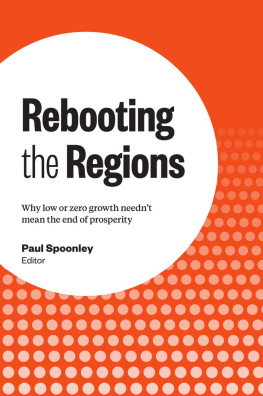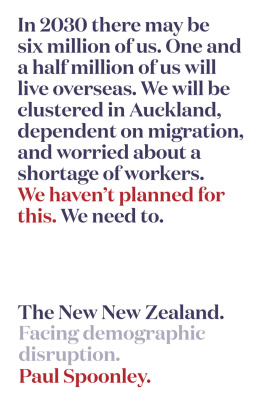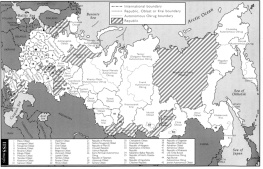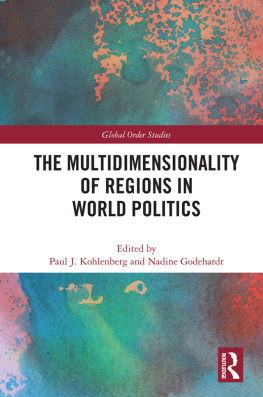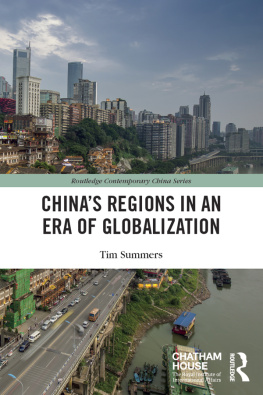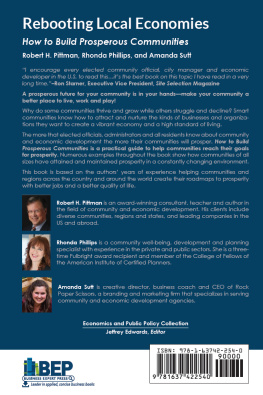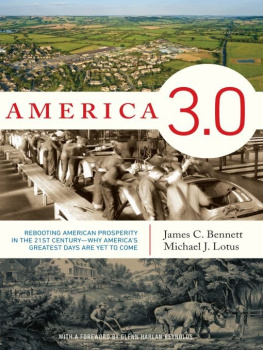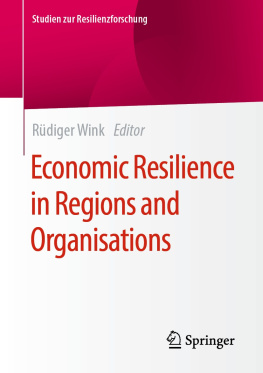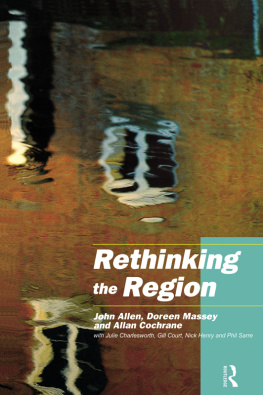Paul Spoonley - Rebooting the Regions: Why low or zero growth neednt mean the end of prosperity
Here you can read online Paul Spoonley - Rebooting the Regions: Why low or zero growth neednt mean the end of prosperity full text of the book (entire story) in english for free. Download pdf and epub, get meaning, cover and reviews about this ebook. year: 2016, publisher: Massey University Press, genre: Politics. Description of the work, (preface) as well as reviews are available. Best literature library LitArk.com created for fans of good reading and offers a wide selection of genres:
Romance novel
Science fiction
Adventure
Detective
Science
History
Home and family
Prose
Art
Politics
Computer
Non-fiction
Religion
Business
Children
Humor
Choose a favorite category and find really read worthwhile books. Enjoy immersion in the world of imagination, feel the emotions of the characters or learn something new for yourself, make an fascinating discovery.
- Book:Rebooting the Regions: Why low or zero growth neednt mean the end of prosperity
- Author:
- Publisher:Massey University Press
- Genre:
- Year:2016
- Rating:3 / 5
- Favourites:Add to favourites
- Your mark:
- 60
- 1
- 2
- 3
- 4
- 5
Rebooting the Regions: Why low or zero growth neednt mean the end of prosperity: summary, description and annotation
We offer to read an annotation, description, summary or preface (depends on what the author of the book "Rebooting the Regions: Why low or zero growth neednt mean the end of prosperity" wrote himself). If you haven't found the necessary information about the book — write in the comments, we will try to find it.
Paul Spoonley: author's other books
Who wrote Rebooting the Regions: Why low or zero growth neednt mean the end of prosperity? Find out the surname, the name of the author of the book and a list of all author's works by series.
Rebooting the Regions: Why low or zero growth neednt mean the end of prosperity — read online for free the complete book (whole text) full work
Below is the text of the book, divided by pages. System saving the place of the last page read, allows you to conveniently read the book "Rebooting the Regions: Why low or zero growth neednt mean the end of prosperity" online for free, without having to search again every time where you left off. Put a bookmark, and you can go to the page where you finished reading at any time.
Font size:
Interval:
Bookmark:
Loss of jobs, loss of young people, the ageing demographic, the apparently irresistible magnet of Auckland
The economic fortunes of New Zealands regions are of great concern to politicians, the business community, schools, employers and indeed most citizens.
What is the dynamic at work here? Is there a remedy? Is there a silver lining? What works? What doesnt? What are the smart regions doing that shows promise?
This collection of expert articles addresses the issues facing our regions, and investigates the reasons for population loss. Often those solutions involve facing up to the fact that decline is inevitable and unavoidable and then coming up with smart new plans and policies that accept that the end of growth does not have to mean the end of prosperity.
New Zealand, like nations throughout the world, faces a period of significant change and uncertainty. These changes pose challenges for communities across the country. How we manage these challenges and the decisions we make today will have a direct bearing on our quality of life in years to come.
Changes to our climate, environment, demography and the nature of work will alter the ways we live considerably. Whether its coping with increased urbanisation and what that means for both cities and regions, responding to climate change, or caring for our environment, big challenges lie ahead.
How these changes affect regional New Zealand will have a huge impact on the whole country. The theme of this book strikes a chord with the local government sector in New Zealand, where considerable work is under way to identify the major shifts and begin conversations with communities about how to build resilience and ensure everyone has the opportunity to prosper.
This year Local Government New Zealand (LGNZ) launched The 2050 Challenge, a discussion paper aimed at future-proofing our communities, which sets out what we see as the major challenges ahead. This piece of work has identified urbanisation as one of the major modifications we face. Having more people living in urban areas poses a big challenge for regional communities. Uneven economic growth has seen some regions growing faster than others, with some attracting population while others are losing it.
Auckland continues to develop into an international city, and Christchurch rebuilds itself from the devastating earthquake damage of 2010 and 2011. Auckland has been growing rapidly and is now home to 1.4 million people out of a total population of 4.5 million. The city needs to be able to meet the demands of its growing number of inhabitants. Meanwhile, the Canterbury region is undergoing a rebuild process and has been the focus of much central government attention and resources.
However, while Auckland and Christchurch are both critical to New Zealands success, the countrys economic growth strategy needs to consider the nation as a whole, and the needs of its regions. There is a possibility that increased regional connectivity, enabled by technology, and other shifts might reverse the trends the whole world is witnessing, but the best estimates show that, in coming years, a greater proportion of the country will live in cities.
Whether a town or a city is growing or contracting, challenges are present. The problems that Auckland and other growth regions face in terms of housing affordability, traffic congestion and the cost of living are well known. These areas need to expand services and infrastructure to support larger populations, and to do so in a way that is sustainable and does not overwhelm other community objectives.
Areas experiencing population contraction face a different set of issues. These communities need to make big decisions about whether, when and how much to invest in renewing large-scale, long-lived public infrastructure to meet the needs of an uncertain future population. In a rates system based on population funding, these investments are difficult.
Opportunities to reinvigorate these communities need to be identified and fostered. It could be through maximising the lifestyle options afforded by communication and transport technology. We need to find ways to develop our regional centres into environments that offer opportunities in education, employment and business, as places where skilled locals want to stay and set up business, and where skilled migrants want to settle.
These things are not easy to plan for, or to achieve. From LGNZs perspective, a collaborative approach between local and central government and communities is needed to address issues of such magnitude. The challenges we face can be daunting, but decisions need to be made across the public and private sectors. Failing to act will not help us to create the prosperous communities we want.
How we make these decisions is critical and should include a whole of systems approach that involves all decision-makers local and central government, and the public and private sectors. This is not a new concept, but the scale of coordination needed is growing, and we need to share experience to develop better models. We need to involve communities in the decision-making process in real ways, so that the diversity of our communities is reflected in the choices made. And we need to be able to respond to the uncertainty that pervades all of these challenges so that we are able to incorporate an evolving evidence base and make no regrets decisions.
The change that is occurring and the pace at which it is happening can be overwhelming. But what is good to see is that the discussion about how New Zealand adapts and changes, too is well and truly underway.
Lawrence Yule
President, Local Government New Zealand
Paul Spoonley
Massey University
The second decade of the twenty-first century is proving to be significant for several reasons. It began with the global financial crisis that confirmed a number of the characteristics of a society like that of New Zealand: the changing nature of employment and of the employment contract that reflects underlying shifts in production (where and how); the hypermobility of modern migration flows (including the reappearance of forced migration as epitomised in the Syrian crisis); the growing diversification of New Zealand (and the superdiversity of Auckland); the pressures and limitations felt by national governments attempting to manage globalisation and the impacts of what The Economist has called the third great divide as computerisation and digitisation change how we live and work; and the stresses of a society in which the economic and social opportunities of its communities are on diverging paths. This book focuses on one aspect of how these changes are playing out: the implications for regions. Moreover, we want to emphasise the demographic drivers and impacts.
Given the extent of these changes and the way in which they are changing our lives, it is important that we have information that helps us understand the issues and options. We have combined with Massey University Press to provide some views and data that will hopefully help New Zealanders to understand these complex trends and dynamics and to encourage debate about what we want to see happen. Not all of the challenges faced by regions are rehearsed in this book, but we do want to emphasise the challenges presented by the very significant demographic changes that will characterise this second decade of the twenty-first century. These trends have been obvious for a while consider the structural ageing of New Zealands population but over the coming decade the number of those aged over 65 will double, the very high current rates of immigration will continue to drive population growth and diversity, and we will continue to see the implications of changing entry:exit ratios for the size and distribution of the workforce. Each of these demographic changes can be seen through a regional lens when it comes to implications for economic and social options. It is this lens that we use here to explore developments and the future for regions in New Zealand.
Font size:
Interval:
Bookmark:
Similar books «Rebooting the Regions: Why low or zero growth neednt mean the end of prosperity»
Look at similar books to Rebooting the Regions: Why low or zero growth neednt mean the end of prosperity. We have selected literature similar in name and meaning in the hope of providing readers with more options to find new, interesting, not yet read works.
Discussion, reviews of the book Rebooting the Regions: Why low or zero growth neednt mean the end of prosperity and just readers' own opinions. Leave your comments, write what you think about the work, its meaning or the main characters. Specify what exactly you liked and what you didn't like, and why you think so.

